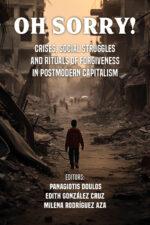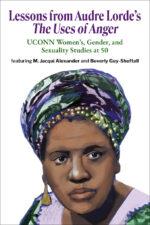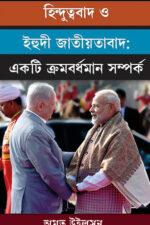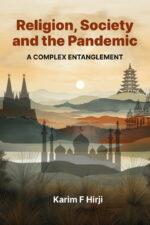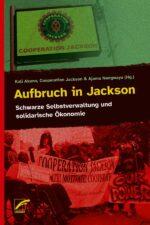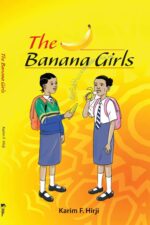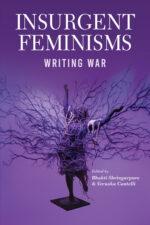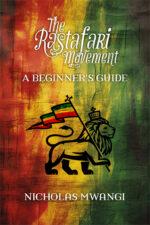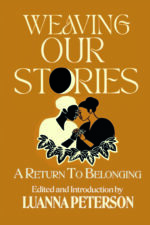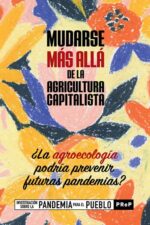-
(Arabic edition) الهندوتفا وعلاقتها بالصهيونية
هندوتفا
وارتباطها بالصهيونيةأمريت ويلسون
سلسلة محاضرات عن إسرائيل
المساهمة: لاهور ألباست، مؤسسة الدراسات الفلسطينية، الولايات المتحدة الأمريكية
المشرف: الدكتور فيريندر سينغ كالرا
المحرر: طارق محمود، الجامعة الأميركية في بيروتكتب هذا النص في كانون الأول/ديسمبر 2022، وهو مقتبس من محاضرة ألقيت بدعوة من مؤسسة الدراسات الفلسطينية. ومنذ ذلك الحين، تعمقت العلاقات بين إسرائيل والهند وتصاعدت الفظائع في كلا البلدين. في 5 إبريل 2023، اقتحمت قوات الاحتلال الإسرائيلي باحات المسجد الأقصى في القدس الشرقية المحتلة، واعتدت على المصلين بداخله. وفي الوقت نفسه، تواجه إسرائيل اضطرابات داخلية في الصراع بين مجموعة متنوعة، بما في ذلك أولئك الذين يعتقدون أن المستعمرة الاستيطانية الحالية هي دولة ديمقراطية ويريدون أن تبقى الأمور على ما هي عليه، وكذلك أولئك الذين يقفون على اليمين. والأهم من ذلك أن الحزب الحاكم في الهند، حزب بهاراتيا جاناتا، يدعم الخيار الأخير. يدور الكتاب حول هندوتفا، الأيديولوجية التي تحرك حكومة رئيس الوزراء ناريندرا مودي، حزب بهاراتيا جاناتا الذي يهيمن عليه الهندوس، والصهيونية، أيديولوجية دولة الفصل العنصري الإسرائيلية. وفي هذا العصر الذي يتسم بالفاشية الناشئة، تشكل هاتان الأيديولوجيتان المتشابهتان إلى حد لافت للنظر أهمية بالغة في تعزيز التحالفات الاقتصادية والعسكرية بين اثنتين من أكثر الدول اليمينية قمعية في العالم ـ وفي الوقت نفسه إضفاء الشرعية عليها في الساحات الثقافية. إن إسرائيل بلا شك دولة استعمارية استيطانية، لكنها أيضًا دولة فاشية، مثل الهند، ليس فقط بسبب “الأحزاب المتطرفة التي تشكل جزءًا من الحكومة” ولكن أيضًا “على حد تعبير مسؤوليها – نتنياهو ومروان بشارة”. نتنياهو هو “الأب الروحي للفاشية الإسرائيلية الحديثة”.
Written in December 2022, this text is based on a lecture given earlier at the invitation of the Institute of Palestine Studies. Since then, the relationship between Israel and India has deepened further and atrocities have skyrocketed in both countries. On 5 April 2023, Israeli forces stormed Al Aqsa Mosque compound in occupied East Jerusalem and attacked worshippers inside. At the same time, Israel is facing internal turmoil in a battle between a diverse group, including those who think the current settler colony is a democratic nation and want things to remain as they are, and those who stand even further to the right. Significantly, the BJP, India’s ruling party, supports the latter. This book is about Hindutva, the ideology which drives the Hindu-supremacist Bharatiya Janata Party (BJP) regime of Prime Minister Narendra Modi, and Zionism, the ideology of the Israeli apartheid state. In this era of rising fascism, these two remarkably similar ideologies are crucially important in cementing the economic and military alliance between two of the world’s most repressive right-wing states – while helping to legitimize them in cultural arenas. Israel is, of course, a settler colonial state, but it is also, like India, a fascist state, not only because of ‘the extremist parties that [are] part of the government’ but also because of ‘their enablers – Netanyahu and his chauvinistic Likud party which long strove for a Jewish state dominating both sides of the Jordan River.’ In the words of Marwan Bishara, Netanyahu is ‘the godfather of modern Israeli fascism.’
-
ہندوتواہ اور صیہونیت کے ساتھ اس کا تعلق(Urdu edition)
ہندوتواہ
اور صیہونیت کے ساتھ اس کا تعلقاَمرت وِلسن
اسرائیل پر لیکچرز کا سلسلہ
معاون: لاہورہ آلباسٹ ، ادارہ برائے مطالعہ فلسطین ، یو ایس اے
ثالث: ڈاکٹر وریندر سنگھ کالرا
ایڈیٹر: طارق محمود ، امریکن یونیورسٹی بیروتدسمبر 2022 میں لکھا گیا، یہ متن انسٹی ٹیوٹ آف فلسطین سٹڈیز کی دعوت پر دیے گئے ایک لیکچر پر مبنی ہے۔ اس کے بعد سے اسرائیل اور بھارت کے تعلقات مزید گہرے ہوئے ہیں اور دونوں ممالک میں مظالم آسمان کو چھونے لگے ہیں۔ 5 اپریل 2023 کو اسرائیلی فورسز نے مقبوضہ مشرقی یروشلم میں مسجد اقصیٰ کے احاطے پر دھاوا بول دیا اور اندر نمازیوں پر حملہ کیا۔ ایک ہی وقت میں، اسرائیل کو ایک متنوع گروہ کے درمیان لڑائی میں اندرونی انتشار کا سامنا ہے، جن میں وہ لوگ بھی شامل ہیں جو یہ سمجھتے ہیں کہ موجودہ آباد کار کالونی ایک جمہوری قوم ہے اور چاہتے ہیں کہ چیزیں جوں کی توں رہیں، اور وہ بھی جو دائیں طرف کھڑے ہیں۔ اہم بات یہ ہے کہ بھارت کی حکمران جماعت بی جے پی مؤخر الذکر کی حمایت کرتی ہے۔ یہ کتاب ہندوتوا کے بارے میں ہے، وہ نظریہ جو وزیر اعظم نریندر مودی کی ہندو بالادستی بھارتیہ جنتا پارٹی (بی جے پی) حکومت کو چلاتا ہے، اور صیہونیت، اسرائیلی نسل پرست ریاست کا نظریہ۔ ابھرتے ہوئے فاشزم کے اس دور میں، یہ دونوں نمایاں طور پر ملتے جلتے نظریے دنیا کی دو سب سے زیادہ جابرانہ دائیں بازو کی ریاستوں کے درمیان اقتصادی اور فوجی اتحاد کو مضبوط بنانے میں انتہائی اہم ہیں – جبکہ ثقافتی میدانوں میں انہیں قانونی حیثیت دینے میں مدد فراہم کرتے ہیں۔ اسرائیل بلاشبہ ایک آبادکار نوآبادیاتی ریاست ہے، لیکن یہ بھارت کی طرح ایک فاشسٹ ریاست بھی ہے، نہ صرف ‘انتہا پسند جماعتوں جو کہ حکومت کا حصہ ہیں’ کی وجہ سے بلکہ ‘ان کے اہل کاروں – نیتن یاہو اور مروان بشارا کے الفاظ میں، نیتن یاہو ‘جدید اسرائیلی فاشزم کا گاڈ فادر’ ہے۔
Written in December 2022, this text is based on a lecture given earlier at the invitation of the Institute of Palestine Studies. Since then, the relationship between Israel and India has deepened further and atrocities have skyrocketed in both countries. On 5 April 2023, Israeli forces stormed Al Aqsa Mosque compound in occupied East Jerusalem and attacked worshippers inside. At the same time, Israel is facing internal turmoil in a battle between a diverse group, including those who think the current settler colony is a democratic nation and want things to remain as they are, and those who stand even further to the right. Significantly, the BJP, India’s ruling party, supports the latter. This book is about Hindutva, the ideology which drives the Hindu-supremacist Bharatiya Janata Party (BJP) regime of Prime Minister Narendra Modi, and Zionism, the ideology of the Israeli apartheid state. In this era of rising fascism, these two remarkably similar ideologies are crucially important in cementing the economic and military alliance between two of the world’s most repressive right-wing states – while helping to legitimize them in cultural arenas. Israel is, of course, a settler colonial state, but it is also, like India, a fascist state, not only because of ‘the extremist parties that [are] part of the government’ but also because of ‘their enablers – Netanyahu and his chauvinistic Likud party which long strove for a Jewish state dominating both sides of the Jordan River.’ In the words of Marwan Bishara, Netanyahu is ‘the godfather of modern Israeli fascism.’
-
IGOLI EGOLI
USD $ 14.00Contents
IGOLI
On love (xxxiii) 13 Dorothy Masuku in Sophiatown 2018 14 Re-Map 16 On love (xxxiv) 18 56 Chapman Street 19 Yesterday Today Tomorrow 20 Marlboro Winter 21 Diepsloot Winter (pre-loadshedding) 22 Only in Jozi 23 Dispossession 24 Ontvangs B Helen Joseph Hospital 25 Mammogram Waiting Room Roodepoort 26 Pholosong Emergency 27 1st Road 28 Inclines 29 Counterclock Clock 30 airbnb Meldene 32 Meldene to Melville, COVID-19 late third wave 33 Excess death or, Acer rubrum 34 Westdene Winter or, Masculinity 35 Shrieking yellow 36 Fleurhof 37 Intraction Extraction 38 On love (xxxv) 40 Moon Garden 41 On love (xxxvi) 42 Garnets or, On love (xxxvii) 43 Spirit 44 Lower 4th Westdene or, On love (xxxviii) 45 On love (xxxix) 46 Natalia Molebatsi and Bab’Themba Mokoena in dance 47 Maps 48 inimba 49 On love (xl) 50 On love (xli) 51 Footsteps 52 inimba (ii) 53 On love (xlii) 54 iSothamilo or, On love (xliii) 55 big little forest 56 On love (xliv) 57
EGoli
or, Only in Jozi (ii) or, On love (xlv) 62 Origins 63 metsi/amanzi/emanti/mvura/madzi/ruwa/water/ /l’eau/ 65 Down Main Street Melville or, Umsebenzi 66 Umsebenzi (ii) 67 Footsteps (ii) 68 Where will we go? 69 RosesRunways 70 On love (xlvi) or, Umsebenzi (iii) 71 72 Wealth 74 Recipe or, Wealth (ii) 75 On love (xlvii) 76 sodade (iii) or, Joy of Jazz Sandton 2017 77 Mushrooms in Mint or, On love (xlviii) 78 Footsteps (iii) 80 Distances 81 Only in Jozi (iii) 82 Greenhill Grocer or, On love (xlix) 83 Only in Jozi (iv) or, On love (l) 84 Fidel Castro at Lillisleaf Farm 2017 or, On love (li) 87 After the launch of Cradles or, 2018 or, On love (lii) 90 sodade (iv) EGoli or, On love (liii) On love (liv)
A new collection of poems by Salimah Valiani. IGoli EGoli is a sociopolitical reading of Johannesburg drawing on its famous, and not so famed, people, places, plants & pronouncements.
First published by [email protected]
-
Then He Sent Prophets
In mid-fourteenth century Fes, Zakaria is a gifted young scholar trying to make ends meet while committing to a rigid moral code. Refusing to be tempted by a life of power and fortune, he is writing a reform book about Islam to guide a society that has lost its moral compass. But Zakaria lives in a time of compromise—unsuited for idealists, especially those with modest means. Devastated by his inability to pay for the treatment of his sick daughter, he seeks a job at the palace through Ibn Khaldun, the sultan’s secretary
Zakaria joins the royal chancery and tries to nourish the idea that he could walk the thin line of serving the sultan without sacrificing his principles. Soon enough, however, a rumor spreads that the sultan has murdered twenty children from the royal family to consolidate his reign. Zakaria’s equally idealist childhood friend, Musa, gets involved in a related incident, accuses all who serve the sultan of complicity in this crime, and falls out with Zakaria for the first time in their lives. Unable to resign from his job because a palace official has acquired his “blasphemous” manuscript and is manipulating him, Zakaria spends a year tormented by his conscience and shunning public affairs. But the situation in Fes goes from bad to worse, Musa decides to take part in an attempt to topple the sultan, and the death of Zakaria’s proud grandmother, who was disappointed in how his life had turned out, pushes him to the brink of collapse. To save his protégé, Ibn Khaldun convinces the sultan that Zakaria should join Muhammad ibn Yusuf, the exiled king of Granada, on his journey to Andalusia to reclaim his throne.
During the expedition, Zakaria acquires the complete trust of Muhammad, who decides to make him a principal adviser. Zakaria develops ideas of grandeur, convinces himself this is his much-awaited chance to use his scholarship to help people, and persuades Muhammad against all counsel to withhold military activity to avoid a civil war. Zakaria’s purposefulness, however, is soon diverted by a mad obsession with Muhammad’s enchanting sister Aisha, and his insistence on withholding military activity backfires after a rebellion breaks out in Fes, leading to the withdrawal of the sultan’s army supporting Muhammad and leaving him exposed. On receiving news that his family has perished in a fire in the uprising in Fes, Zakaria suffers an emotional shock but follows Muhammad, whose fondness of Zakaria has turned into an abhorrence, in a failed attack on Granada. Muhammad escapes to his allies in Castile after sacrificing his loyal guards and vindictively assaulting Zakaria, who loses consciousness on the battlefield.
In Castile, Zakaria comes to his senses, recalls his family’s tragedy, develops an intense rage, cuts his relationship with Aisha, and contemplates killing Muhammad upon hearing he has accepted military help from the Castilians to reclaim his throne. Before executing this plan, Zakaria learns that his daughter has survived the fire and is in Granada with Musa. Zakaria sets out there, wishing the reunion with his daughter would spare him some of his agonies, but she shuns him, and after the war starts, he blames himself for leaving Castile without killing Muhammad, believing his death would have saved thousands. Muhammad and the Castilians move to attack a castle near Granada, and Zakaria joins the defending army along with Musa. In an ensuing battle, Zakaria slays a preacher supporting Muhammad, whom Zakaria has known since childhood and always considered corrupt, while Musa’s fierce resistance against the invaders inspires Muhammad to abdicate his throne. Zakaria returns to Granada in a shattered state as the Castilians continue their attacks with the pretext of reinstating Muhammad despite his withdrawal.
The killing of a soul makes Zakaria finally realize that all his attempts to live ethically have led to misfortunes because they were driven by pride—not empathy. This desire to love and excuse everyone is, however, challenged by witnessing a simple incident of domestic violence, where he finds himself neither able to justify it nor act to change it without compromising his new spiritual realization. Concluding that life is unbearable because living would always entail compromises, watching the Castilians closing in on Granada and Musa vowing to fight to the death, and judging that Muhammad’s abdication of the throne, despite his past failings, makes him the best possible ruler, Zakaria decides to sacrifice himself, save his childhood friend, and end the war. After impersonating Musa, Zakaria deceives Muhammad’s cousin, the king of Granada, into seeking the arbitration of the Castilians and sets out with him to Seville, where they are both executed.
Part I
- The Eyebrow
- Blamed for Everything
- The Cursed Child
- The Slippers
- The Enemy of Horses
- Tamima’s Stone
- The Overthrown King
- Except the Sultan
- Muslims and Mujrims
- No Musicians or White Storks
Part II
- The Royal Chancery
- Are We Not All Muslims?
- On Ethics and Rituals
- The Voice of Fes
- The Rift
- A Cup of Milk
- A Year to Forget
- The Bad Smell
- A Sultan’s Verdict
- Um al-Wazir
Part III
- The Journey
- The Caravan
- The Race
- The Princess
- The Savior
- An Eye Without an Eyebrow
- The Sword Verse
- The Philosopher King
- The Mad Scholar
- Jahannam
Part IV
- The Crow
- The Fall
- The Frying Pan
- The Hypocrite
- Reunion
- A Knight without a Horse
- An Innocent Soul
- The Mirror
- Gold and Diamonds
The Red Prophet
-
Beside the Sickle Moon: A Palestinian Story
Beside the Sickle Moon is near future literary activism based on Israel’s occupation of Palestine. The story tells a first person narrative through Laeth Awad, a Palestinian who lives above his convenience store experiencing days pass through smoke clouds with his cousin Aylul. One night upon returning to their village from Ramallah they encounter an Israeli checkpoint within the buffer zone that hadn’t been there before. It isn’t long until the two stumble upon Israel’s plans to construct a luxury hotel for incoming settlers, Ma’al Luz. Demolition crews and military personnel are due to fulfill this contract in the months to come and with them as overseer is the infamous Meir Cohen, a Mossad operative who played a key role in the fall of Gaza.
Aylul believes from their father, an Al Qassam militant who died in the battle for Jericho, that only the threat of annihilation breeds the best of human action. They use their contacts to connect with the factions, who grant them strength to defend their village from occupation. With these resources in hand Aylul forms Al Mubarizun, a group crowning themselves Palestine’s final resistance.
Laeth doubts the existence of a future, lost in philosophical ambivalence as he tries to follow his cousin into the depths of guerrilla warfare. He questions the futility of resistance when all former allies have normalized relations with Israel. And what of the innocents on the other side of the Wall who had no say in where they were born? Though a minority of the population, he is not alone in this sentiment. Palestinian youth begin to empathize with this logic enough to create a new social movement, the Forgotten Ones. Coining the derogatory term that their critics slung, the NGO advocates for a peaceful transition to Israel’s colonization where most Palestinians hear whimpers of surrender.
-
The Unfinished Business of Liberation and Transformation: Revisiting The 1958 All-African People’s Conference
Inspiring the Next Generation of Pan-Africanists
This book features essays, speeches, and reflections from the 60th anniversary commemoration of the All-African People’s Conference (AAPC), an epochal event in the history of Africa’s fight for liberation. The four-day conference was a collaboration between the Institute of African Studies, Trades Union Congress of Ghana, Socialist Forum of Ghana, Lincoln University, and the Third World Network Africa.
Overview
The book is divided into three sections:
- Essays:
-
- Ten essays explore key themes such as decolonizing knowledge production, new political frameworks for democracy and security, economic liberalization and labor crises, and the evolution of Pan-Africanism.
- Speeches:
- This section includes the welcome and closing addresses, solidarity messages from prominent Pan-Africanists, and an interview with the last living delegate of the 1958 AAPC.
- Documentation:
- The final section provides conference background documentation and the Statement of Issues and Recommendations adopted by the Conference.
The book is bookended by poems from Pan-Africanist scholar-poets, offering valuable perspectives on Africa’s current challenges and potential future.
Forum of Ghana, Lincoln University, and the Third World Network Africa.
The book consists of three sections. The first contains ten essays on some of the conference’s key themes – decolonising knowledge production, a new politics for substantive democracy and security, economic liberalisation and the crises of work, and Pan-Africanism yesterday, today, and tomorrow. The second section features speeches delivered at the Conference – the welcome and closing addresses, solidarity messages from prominent pan-Africanists as well as an interview with the last living delegate of the 1958 All-African People’s Conference. The last section contains the conference background documentation and the Statement of Issues and Recommendations adopted by the Conference. The bookends are two poems by pan-Africanist scholar-poets. The book offers valuable perspectives on Africa’s current predicaments and what a truly liberated Africa can offer to the world.
Why Read This Book?
This book provides an invaluable collection of perspectives on Africa’s ongoing quest for true liberation. Whether you are a Pan-Africanist, a scholar, or a history enthusiast, you’ll find inspiration and insight in these pages. Join us in celebrating the legacy of the All-African People’s Conference and envisioning what a truly liberated Africa can offer to the world. Let this book be a catalyst for your own journey towards Pan-Africanism and the future of Africa. So, continue reading, and let the voices of these Pan-Africanists guide and inspire you on your own path towards creating a better world for all.
Conclusion
The stories, essays, speeches, and poems featured in this book are not simply a reflection of the past – they are a call to action for the present and future generations of Pan-Africanists. May this book serve as a reminder that our liberation is intertwined with the liberation of others and that we must work together toward building a more just and equitable world. Let us continue to inspire the next generation of Pan-Africanists and keep the spirit of the All-African People’s Conference alive. As Kwame Nkrumah once said, “Our independence is meaningless unless it is linked up with the total liberation of Africa.” Let this book be a step towards that ultimate goal – the liberation of Africa and its people.
TABLE OF CONTENTS
Invocation
- Ancestral Roll-Call – Kofi Anyidoho
Introduction- Back to the Future: The 1958 AAPC and the Power of Optimism
Section 1
- Revisiting The 1958 All-African People’s Conference –The Unfinished Business of Liberation and Transformation – Georges Nzongola-Ntalaja
- Revisiting The 1958 All-African People’s Conference –The Unfinished Business of Liberation and Transformation – Horace Campbell
- Pan-Africanism in Mwalimu Nyerere’s Thought – Issa Shivji
- Ghana (1957 – 1966): Reflections and Lessons From a 20th Century Pan-African Liberated Nation-State – D. Zizwe Poe
- Transnational Citizenship on the Borderlands: Towards Making (Non)Sense of National Borders in Africa – Edem Adotey
- Looking Backwards to Run Forward: A Critical Examination of the 60th Anniversary of the 1958 All-African People’s Conference – Mjiba Frehiwot
- Generating Inclusive and Sustainable Growth: Challenging Neoliberal Approaches to Gender Mainstreaming in Regional Economic Integration in Africa – Adryan Wallace
- A Brief History of Development Initiatives in Africa – Anthony Yaw Baah
- Pan-African Epistemologies of Knowledge Production: A Deconstruction-Based Critical Reflection – James Dzisah & Michael Kpessa Whyte
- Hip-Hop Studies as a Model for Anti-imperialist Research in Africa – Msia Kibona Clark
Section 2
- Speech by the chair of the Secretariat 60th Anniversary of the All-African People’s Conference – Dzodzi Tsikata
- Speech by H.E Thabo Mbeki former president of South Africa
- Speech by the Deputy Chairperson of the African Union Commission, H.E. Kwesi Quartey
- Speech by the Chair of the 60th Anniversary of the All-African People’s Conference – Akilagpa Sawyerr
- In-conversation: Speaking with History (participant at the 1958 AAPC) – G. A. Balogun interview – Edem Adotey
Section 3
- AAPC @ 60 Conference Background Documentation
- On culture at the AAPC @ 60 – Eric Tei-Kumado and Edem Adotey
- AAPC @ 60 Conference Recommendations and Issues for the Future
Exhortation
- De Geas of Rickydoc: an Exhortation – Arthur Flowers
-
Oh, Sorry! Rituals of Forgiveness, Crises and Social Struggles in Postmodern Capitalism
USD $ 20.00As the world grapples with the legacy of crimes of enslavement, colonialism, genocide and mass killings, imprisonment and murder of children, attempts at eliminating cultures and history of Indigenous peoples, looting and other crimes against humanity, the performance of public atonement has become increasingly prevalent. Apologies from state actors and institutions are issued in solemn ceremonies, often acknowledging the collective guilt for historical atrocities. Despite the solemnity of these events, there is a growing scepticism surrounding the sincerity of these apologies, particularly when they are not accompanied by tangible reparations, healing, reconciliation or systemic change. This scepticism is rooted in a perception that these acts of contrition are sometimes less about making amends to the aggrieved and more about assuaging the guilt of the aggressors and maintaining the status quo, providing the illusion of progress without the substance.
In this compelling work, Oh, Sorry! Rituals of Forgiveness, Crises and Social Struggles in Postmodern Capitalism, the authors unveil the complex interplay between public apologies, social justice and popular mobilisations. The chapters are devoted primarily to the experiences of Latin America, particularly of Mexico, Guatemala, Chile, and Brazil. But there is also a chapter on the struggles for Palestine — so relevant in the face of the current genocidal invasion by the Zionist State of Israel into Gaza, the world’s largest and most densely populated concentration camp. -
Lessons from Audre Lorde’s The Uses of Anger: UCONN Women’s, Gender, and Sexuality Studies at 50
USD $ 15.00In recent years, we have witnessed renewed calls for women to embrace anger as a source of power. These voices have Lorde’s “The Uses of Anger”, first delivered at the University of Connecticut (UCONN), Storrs, in 1981, to thank for charting an innovative scholarly and poetic terrain that theorizes anger as much more empowering and liberating than conventional discussions of the term typically allow.
Lorde’s essay redefined anger productively, approaching it as an epistemological tool igniting a desire for self and collective liberation. The result was a remarkable critical reflection that laid the groundwork for deconstructing broader systems of oppression, particularly, heteronormativity, heteropatriarchy, institutionalized racial poverty, racial capitalism, and white privilege. Lorde’s essay moved with precision, centering Black women’s struggles in a world built around the use – and abuse – of racialized people subjected to systematic dehumanization.
In their introduction, Jane Anna Gordon, Elva Orozco Mendoza, and Sherry Zane reflect on the inheritance, lessons, and responsibilities that Women’s, Gender, and Sexuality Studies must grapple with if it is to deepen and fulfill its radical mission.
Guided by the imperative to look backward to understand the present and forge a future, the book closes with a sankofic interview with M. Jacqui Alexander and Beverly Guy-Sheftall, conducted by Briona Simone Jones.
-
Being Anti-Colonial
From: USD $ 1.00Being Anti-Colonial by Jayan Nayar presents a profound critique of the contemporary engagements with ‘decolonial theory’ and the popular usage of ‘decolonisation’. This work argues that much of the current discourse within critical theory tends to overlook the intricate, essentially praxiological underpinnings of the anti-colonial struggle, thereby comfortably situating itself within the post-colonial status quo. Nayar’s book serves as a radical call to authentically re-engage with the anti-colonial ethos, emphasizing the necessity to confront the enduring architectures of coloniality that define our present. Distinctly divided into two parts, the book first elucidates the conceptual groundwork to reconceptualise ‘anti-colonial’ as a philosophical stance deeply entwined with the fabric of the global (post)colonial reality. Through meticulously argued philosophical foundations, Nayar underscores the (post)colonial present as a state of ‘resettlement’, where the architecture of post-colonial world-making loses sight of its colonial matrices. Being Anti-Colonial is both an invitation and a challenge to the academic community to critically revisit and re-energize the conversation about coloniality.
-
LENIN: The Heritage We (Don’t) Renounce
These 100 tributes, from every continent, are like building blocks, in word and image creating not a mausoleum, but paths to a new future… It’s about thinking with and through Lenin, and the proof is here. — Isabelle Garo, author of Communism and Strategy.
The organic intellectuals in this book have woven a thread of what is to be done in the heart of fascism today, a tool for reclaiming our humanity. — Gacheke Gachihi, member of the Kenya Organic Intellectuals Network.
A left that rejects Lenin’s legacy in times of catastrophic capitalism and imperialist war can neither be truly left-wing nor have a decisive influence on world history. —Michael Brie, author of Rediscovering Lenin.
Lenin: The Heritage We (Don’t) Renounce brings together 100+ authors and visual artists from 50+ countries across the world – from Afghanistan to Zimbabwe – in order to critically commemorate the hundredth anniversary of the death of Vladimir Ilyich Ulyanov, aka Lenin, on 21 January 1924.
Combining academic, journalistic and more personal-political texts, including poetry, theatrical skits and fictional writing, the books’ contributors aim to identify and constructively engage with the living legacy of Lenin’s life and work before, during and after the October Revolution. Concretely, the 100+ texts deal with a great variety of “old [Leninist] truths that are ever new” (Lenin), both historically and in today’s times: Imperialism, the National Question and the Right to Self-Determination, the Vanguard Party, Trans Liberation, Ecological Leninism, Dialectics, Artificial Intelligence, Military Marxisms, Black Liberation, Communist Feminism as well as Revolutionary Dreaming and Organising, among many others.Also, Lenin is put into dialogue with a number of revolutionary comrades-in-arms, among them Amílcar Cabral, Mao Zedong, Julius Nyerere, José Carlos Mariátegui, Julio Antonio Mella, G.F.W. Hegel, Antonio Gramsci, Qu Quibai, Alexandra Kollontai and Rosa Luxemburg.
In sum, the book aspires to help liberate the old Ilyich from the musty, petrifying solitude of his mausoleum and to invite him back into the “real movement, which abolishes the state of things” (Marx & Engels) in the here and now, i.e. our multiple, intersecting struggles against all types of capitalist-colonial-heteropatriarchal-ableist oppression and for the rekindling and strengthening of the new Communist horizon.
While many on the contemporary Left continue to openly disavow any association with Tovarish Lenin, Lenin: The Heritage We (Don’t) Renounce affirms the opposite – that there will be no revolution without Vladimir Ilyich among our rank-and-file comrade-ancestors. Or in the words of one of the book’s authors, Himani Bannerji, “We neglect Lenin’s voice at our own peril.”
To work, everybody, to work,
the cause of the world socialist revolution
must and will triumph.
(Lenin) -
(Bengali edition) হিন্দুত্ববাদ ও ইহুদী জাতীয়তাবাদ : একটি ক্রমবর্ধমান সম্পর্ক)
This is a Bengali translation of Hindutva and its relationship with Zionism, by Amrit Wilson: ISBN 978-1-990263-76-7. Written in December 2022, this text is based on a lecture given earlier at the invitation of the Institute of Palestine Studies. Since then, the relationship between Israel and India has deepened further and atrocities have skyrocketed in both countries. On 5 April 2023, Israeli forces stormed Al Aqsa Mosque compound in occupied East Jerusalem and attacked worshippers inside. At the same time, Israel is facing internal turmoil in a battle between a diverse group, including those who think the current settler colony is a democratic nation and want things to remain as they are, and those who stand even further to the right. Significantly, the BJP, India’s ruling party, supports the latter. This book is about Hindutva, the ideology which drives the Hindu-supremacist Bharatiya Janata Party (BJP) regime of Prime Minister Narendra Modi, and Zionism, the ideology of the Israeli apartheid state. In this era of rising fascism, these two remarkably similar ideologies are crucially important in cementing the economic and military alliance between two of the world’s most repressive right-wing states – while helping to legitimize them in cultural arenas. Israel is, of course, a settler colonial state, but it is also, like India, a fascist state, not only because of ‘the extremist parties that [are] part of the government’ but also because of ‘their enablers – Netanyahu and his chauvinistic Likud party which long strove for a Jewish state dominating both sides of the Jordan River.’ In the words of Marwan Bishara, Netanyahu is ‘the godfather of modern Israeli fascism.’ This essay focuses primarily on Hindutva, discussing Zionism mainly to highlight its similarities, links and increasing alliances with Hindutva.
-
Religion, Society and the Pandemic: A complex entanglement
USD $ 7.99 – USD $ 50.00In nearly three years, starting from early January 2020, the coronavirus directly and indirectly consumed the lives of nearly 20 million people worldwide. This book explores the interplay between the coronavirus pandemic and religion on the theological, institutional and societal dimensions. It focuses on Hinduism, Buddhism, Christianity, Islam and secularism, but some minor faith systems are also covered. Exploring the evolution of the pandemic in seventeen nations, it asks: Was religious belief an obstacle or a positive factor in understanding the scientific basis of the coronavirus pandemic? Did religious institutions, leaders and laity facilitate or block the implementation of the official pandemic control measures? Was the role played by religion in the coronavirus pandemic affected by historical, social, economic and political factors? How did secularism operate in the coronavirus pandemic? Did the coronavirus pandemic enhance or undermine religiosity? The basic aim is to draw lessons from this pandemic that will facilitate how humanity may deal with future pandemics in a just and egalitarian social order.
-
Aufbruch in Jackson [German edition of Jackson Rising: Black self-management and solidarity economy]
USD $ 24.00German translation of Jackson Rising: The Struggle for Economic Democracy and Black Self-Determination in Jackson, MississippiHow black activists are building liberation practically from below: Departure in Jackson documents the history of one of the most exciting revolutionary experiments in the USA Present.
Since the 1970s, black liberation movements in majority-black Mississippi have taken change into their own hands. The Deep South should become the center of their independence – “Free the Land!” In the 2010s, the election of Chokwe Lumumba as mayor in the capital Jackson took an important step towards implementing the vision of assembly democracy, solidarity economy and an end to racial inequality. Lumumba dies unexpectedly in 2014, but his son Antar and the Cooperation Jackson continue to move forward.
We learn about the pitfalls of radical local politics and struggles for housing and land, democratic economic models and ecology, internationalist solidarity and the parallels to the Rojava Revolution and the Zapatistas, about encouraging experiences in which different concerns go hand in hand.
-
Insurgent Feminisms: Writing War
War is never just the war itself, it’s not the event or the epoch. War is the impossible and unending afterlife, the struggle to breathe after being bludgeoned, and the re-situating of one’s self and of one’s place after displacement and fragmentation.
Insurgent Feminisms: Writing War advances a new paradigm of war writing by focusing on gender. War is always fought upon the backs of women, often under the pretense of saving them. Yet, along the way, the brutalities unleashed on women during wartime remain relentless. In this collection, insurgency emerges in the raw and meticulous language of witnessing, and in the desire to render the space of conflict in radically different ways. These feminist and queer perspectives on war come out of regions and positions that disobey the rules of war writing. Comprising reportage, fiction, memoir, poetry, and conversations from over sixty writers, the collection includes contributions by Chika Unigwe, Nathalie Handal, Ubah Cristina Ali Farah, Suchitra Vijayan, Bélen Fernández, Uzma Falak, Otoniya Juliane Okot Bitek, Sarah Ladipo Manyika, Lara Pawson, Gaiutra Bahadur, Robtel Neajai Pailey, Sumana Roy and Lina Mounzer, among several others.
Bhakti Shringarpure co-founded Warscapes magazine in November 2011 and it has now transitioned into the Radical Books Collective.
Veruska Cantelli is a writer, translator, editor, and Associate Professor of Interdisciplinary Studies at Champlain College in Vermont, USA.
-
“Nada mal para um N—, Não?” “No está mal para un N—, ¿no?”
Escrito durante as comemorações do septuagésimo quinto aniversário da publicação de Black Skin, White Masks (“Pele Negra, Máscaras Brancas”), de Frantz Fanon, “Not Bad for a N—, No?” oferece reflexões sobre as circunstâncias da publicação desta obra clássica com os insights de Fanon sobre o que ele chamou de tentativa de “assassinato do homem” e a necessidade urgente de a humanidade se tornar “acional”.
Escrito durante las celebraciones del septuagésimo quinto aniversario de la publicación de Black Skin, White Masks (“Piel negra, máscaras blancas”) de Frantz Fanon, “Not Bad for a N—, No?” ofrece reflexiones sobre las circunstancias de la publicación de esta obra clásica con las ideas de Fanon sobre lo que llamó el intento de “asesinato del hombre” y la urgente necesidad de que la humanidad se vuelva “acción”.
-
Weaving Our Stories: Return To Belonging – An Anthology
Weaving Our Stories is a Hawaii-rooted abolitionist program that utilizes storytelling as a vehicle for liberation. Our mission revolves around teaching storytelling as an act of resistance, dismantling harmful existing narratives, and nurturing our ability to weave counter-narratives that acknowledge and celebrate the inherent beauty and brilliance within our storytellers. Through our stories, we advocate for justice and liberation.
This anthology follows the trail of esteemed works such as “This Bridge Called My Back: Writings of Radical Women of Color” and “Na Wahine Koa: Hawaiian Women for Sovereignty and Demilitarization.” This anthology includes poetry, essays, visual art, and narratives penned by authors and artists who identify as Black, Indigenous, and people of color from Hawaii and beyond. While our contributors span a diverse spectrum of experiences and identities, they all share a common commitment to individual and collective well-being. Our contributors astutely showcase how their expressions of resistance and liberation, whether through visual art or written text, align with one or more of the central themes of Weaving Our Stories: resistance through cultural memory, accountability, resisting false binaries, and countering hegemony.
In tandem with the community collection of stories that revolve around resistance, this anthology also highlights the remarkable achievements of our six accomplished Black youth organizers. These young individuals dedicated a year to the Weaving Our Stories Youth Series during the pandemic, delving into the power and relevance of storytelling in our journey of resistance and liberation. Each of the six youth activists provides an overview of their Community Impact Design Projects.
These culminating endeavors addressed community issues by proposing interventions that harness our resistance themes and our three Pillars of Liberation—namely, institutions, structures/methodology, and people.
This anthology offers celebrations of our triumphs, our joys, and our unwavering resilience. Simultaneously, they advocate for our ongoing resistance, insisting on justice and a sincere confrontation with the often-overlooked lived experiences that deserve acknowledgement.
-
I see the invisible
Truth be told, I never thought I would write another volume of poetry after the last, I will not Dance to Your Beat (2011). The reason was that my previous volumes were reactive to the circumstances of the times. Patriots and Cockroaches (1992) was a reaction to the socio-political corruption that had engulfed Africa and dimmed the enthusiasm that had been built by the years of struggle for independence. Whereas we thought we were stepping into a post-colonial era, what we stepped into was a vicious neo-colonial times. The next collection, Poems on the Run (1995) was a reaction to military autocracy and the repression that followed. The volume was literally written underground. This was followed by Intercepted (1998) all written while detained at Kalakuta Republic of Alagbon Close. We Thought it was Oil But it was Blood (2002) responded to two things primarily – extractivism and the accompanying human and environmental rights abuses in the Niger Delta and elsewhere. The massive erosion of biodiversity and attacks on food sovereignty through the introduction of genetically modified organisms (GMOs) into our agricultural system inspired I Will not Dance to your Beat.
What you have in your hands, or on your screens, is a compilation that is largely more meditative than the previous collections. There are moments of reflection on the colonial and neoliberal foundations that permit a willful disconnection from nature and the resultant destructive extractivism.
Some of the poems came through conversations and poetry writing sessions with Peter Molnar, Maryam al-Khawaja — Rafto Human Rights laureates and Salil Tripathi, a member of the board of PEN International, in August 2017. The sessions held at a beautifully rustic location in Celleno, Italy, were documented on celluloid by the duo of Maria Galliana Dyrvik and Anita Jonsterhaug Vedå of SMAU, a multimedia firm in Norway. Poetic relationship with Maria and Anita has continued over the years and their work continues to inspire more and more poems.
-
Mudarse Màs Allá de la Agricultura Capitalista
Los agentes patógenos surgen una y otra vez de un sistema agroalimentario global arraigado en la desigualdad, la explotación laboral y el extractivismo sin límites por el que se despoja a las comunidades de sus recursos naturales y sociales. Un sistema económico propenso a la crisis que prioriza la producción para obtener beneficios por encima de la satisfacción de las necesidades humanas y la preservación ecológica se organiza en torno a una intensa producción monocultural que, por el camino, permite la aparición de las enfermedades más mortíferas.
La Investigación sobre la Pandemia para el Pueblo (PReP) se centra en cómo la agricultura podría ser reimaginada por el tipo de intervención a nivel de la comunidad que podría detener la aparición del coronavirus y otros patógenos en primer lugar. Abordamos cómo la ciencia convencional apoya los mismos sistemas políticos y económicos que ayudaron a producir la aparición del coronavirus y otros patógenos en primer lugar.
Introducimos la agroecología, un ecologismo de los campesinos, los pobres y los indígenas, que existe desde hace mucho tiempo, y que trata la agricultura como una parte de la ecología de la que la humanidad cultiva sus alimentos. La agroecología -una ciencia, un movimiento y práctica- combina la ciencia ecológica, los conocimientos indígenas y campesinos y los movimientos sociales por la soberanía alimentaria y territorial para lograr sistemas alimentarios ambientalmente justos.





